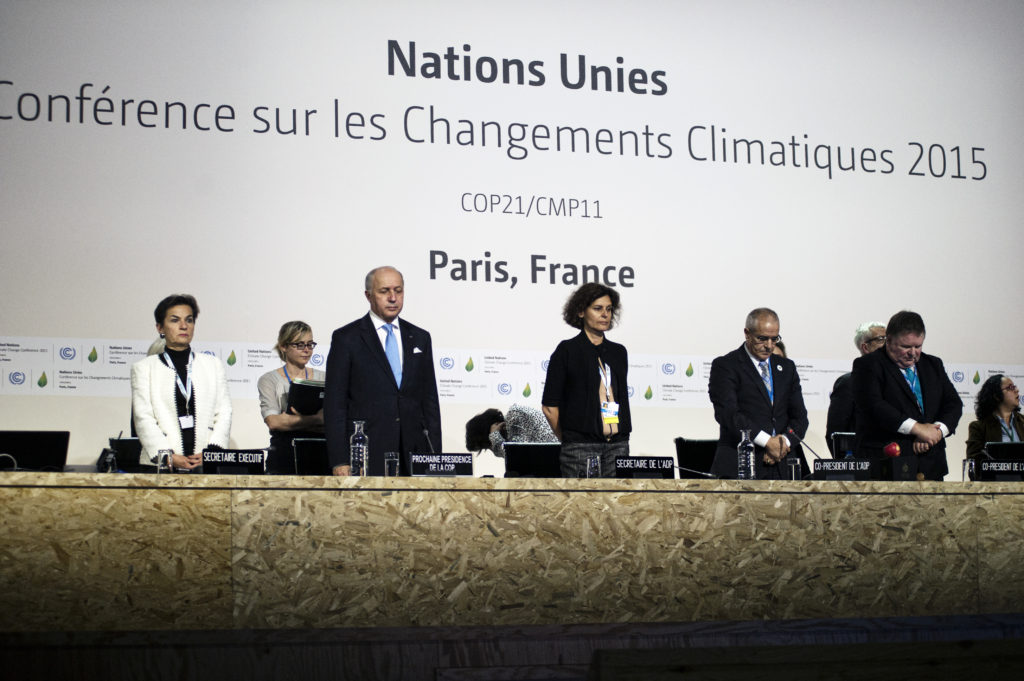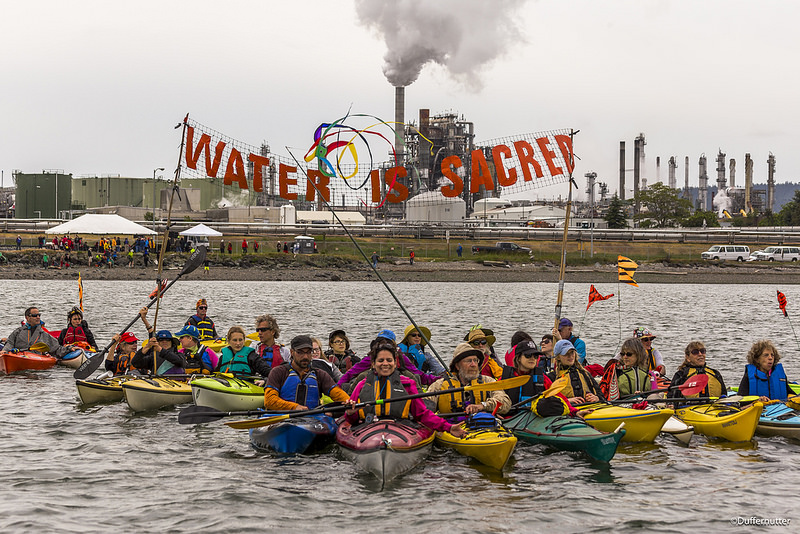
by Matthias Schmelzer
Since the 2014 Leipzig Degrowth Conference, the argument that climate justice cannot exist without degrowth has repeatedly been made. In a keynote at the Degrowth conference in Budapest, in September 2016, I developed this line of thinking further and argued that the opposite is equally important: There is not degrowth without climate justice. My argument, which I presented as someone involved not only at the theoretical level, but also in concrete efforts to bring degrowth and climate justice together in terms of practices and people, is presented here in a concise way.
After the degrowth conference in Leipzig two years ago, people in the organizational committee were considering next steps that would allow the degrowth community to move forward. Our analysis was that if we want degrowth to leave the ivory towers of academia and lecture halls, we need to enter into alliances with other social movements; and if we want degrowth to move beyond lofty visions for future societies and towards intervention and action, we need to enter into a conflictual political arena, thus forcing degrowth to take clear stances. Even though a vision of transformation and a good life for all is important, if degrowth is worth anything, it should make a difference by intervening in political struggles.
Our analysis was that if we want degrowth to leave the ivory towers of academia and lecture halls, we need to enter into alliances with other social movements; and if we want degrowth to move beyond lofty visions for future societies and towards intervention and action, we need to enter into a conflictual political arena, thus forcing degrowth to take clear stances.
Based on this analyses we decided to organize a degrowth summer school in 2015 in cooperation with the Rhineland climate camp. We thus entered a political field, in which concrete opponents – coal companies and their lobbies on the one hand and local communities and climate justice activists on the other – were struggling about the future of coal in the coming years. The summer school drew 500 people from around Germany and Europe who discussed degrowth and its relations to climate change, extractivism, justice, power, and capitalism. After the summer school, many participants took part in one of the hitherto largest actions of civil disobedience against lignite coal mining, in which more than 1000 people entered an open cast coal mine and blocked the operation of the huge diggers in Europe’s largest CO2 emitter. In 2016, Ende Gelände was repeated in Lusatia, and the 3000-participant strong blockade lasted two days. There was again a degrowth summer school under the title “Skills for System Change.” The summer of 2017 will see another degrowth-inspired summer school and a set of actions in the Rhineland that includes Ende Gelände, but will be much broader and possibly even bigger.
The climate summit Truman show
This decision to enter into alliances with the climate justice movement and into the conflicts around coal already illustrates much of our stance on the Paris Agreement reached at the COP in Paris in 2015. First, that it proved a disaster precisely because it did not address the real problems, mainly that fossil fuels must largely stay underground and that we need a deep socio-ecological transformation. Second, that the Paris Agreement could not address these issues, because it largely stayed within the framework of economic growth, extractivism, and accumulation – albeit in a new form. And finally, that real change must come from stopping the drivers of climate change through concrete policies, public opposition, the building of alternatives, and direct action.
From the perspective of degrowth and climate justice movements, the Paris Agreement was a deceitful spectacle with potentially disastrous effects. What actually happened in Paris in November last year has been adequately described as the climate summit Truman Show: around the world, media headlines were enthusiastically celebrating the deal as ‘historic’ and ‘successful’, as the miracle of Paris, or even as a „31 pages of recipe for revolution.“ Cameras were showing the chief negotiator French foreign minister Laurent Fabius in tears, the climate advocate Al Gore enthusiastically clapping, and the room of delegates seemed to be in a collective delirium – and with it the entire media circus. Even many larger NGOs did not want to disturb this picture with their gentle statements, and the online campaigning platform avaaz described it as a „massive turning point in human history.“

Through the technocratic prism of the framework laid out by the UN climate convention, the summit achieved much more than has otherwise been accomplished during the last 20 years and far more than most observers had expected: 195 states actually achieved an agreement; and to the surprise of many in the last minute the 1,5 degree target was included in the final text.
However, this enthusiasm is highly misleading. It only makes sense from a narrow perspective that only focuses on the UN framework of negotiations and not on the broader political and economic context. One can ignore reality, but this does not make it disappear. Diplomacy and a perfectly staged show do not save the climate – this can only be done by leaving the greater part of fossil fuel reserves in the ground, stopping deforestation, and ending industrialized agriculture. And all of this needs to happen quickly, which requires effective a set of measures and policies.
From the perspective of degrowth and climate justice movements, the Paris Agreement was a deceitful spectacle with potentially disastrous effects.
But the Paris Agreement does not include mechanisms and measures to ensure that this target is met. In fact, the Paris Agreement cements and strengthens the illusion of decoupling growth and emission and of green growth through a new level of utopian technocratic optimism – negative emissions. In fact, the agreement willingly accepts missing the 1.5-degree target, and it contains many recipes for a new wave of neo-colonialism in the name of green capitalism. Instead of redefining and changing the economy and the mode of production and consumption that cause climate change, it redefines nature by turning it into a tradable commodity. The market mechanisms embedded in the agreement serve to enable the continuation of high consumption lifestyles in rich countries, while offsetting this overconsumption in the Global South and thus continuing colonial exploitation.
Beyond green capitalism
Degrowth stands in stark opposition not just to the continuation of a „brown“ – fossil fuels-based and extractivist – capitalism, but also to the institutionalization of what seems the most likely alternative – a „green“ capitalism based on the massive investment in renewable energies, global carbon trading regimes, and the economization of nature.
For many of us, the belief that there is „no climate justice without degrowth“ is a fundamental motivation to engage in the degrowth community or movement. The climate justice perspective can inspire an understanding of degrowth that might be more appealing to some – an understanding of degrowth as the democratically-led transformation to societies that are not based on the extraction or import of disproportionate amounts of resources and on the disproportionate use of sinks.
There is no degrowth without climate justice, or – more comprehensively – ecological justice or even global justice.
Nevertheless, it seems to me that this is only one side of the coin, since it stipulates that degrowth is more fundamental and the necessary precondition to achieve climate justice. Of course, there is great potential for cooperation and alliances between the two movements. But in the spirit of what was termed „alliances without subordination“ at the Budapest conference in 2016, I want to turn this around and argue that the other side is equally important: There is no degrowth without climate justice, or – more comprehensively – ecological justice or even global justice.
If degrowth is not built on a comprehensive vision for global justice and fails to incorporate key elements that are clearer and more prominent in the climate justice movement than in degrowth discourses, it will not be the emancipatory project many wish it to be. What can the degrowth community learn from the climate justice movement? I want to highlight three key lessons.
Changing structures
First lesson, the focus on deep structural transformations, transformations in the economic, political, mental, and social structures of our societies. Of course, much has been written and said on this in the degrowth discussion – but it could move further. Beatrice Rodriguez Labajos said that activists in the global South generally think that degrowth is not radical enough, because it is not anti-capitalist and mainly focuses on individual lifestyle-change. Based on the discussions at the recent conferences, a consensus seems to be emerging that degrowth is indeed a proposal to overcome capitalism, and not just a new packaging for business as usual. Similarly, degrowth could be clearer on how to change political structures (for example in the discussions about global trade regimes such as TTIP and CETA, degrowth is largely absent), mental structures such as extractivism in all its forms, and social structures.
Based on the discussions at the recent conferences, a consensus seems to be emerging that degrowth is indeed a proposal to overcome capitalism, and not just a new packaging for business as usual.
If degrowth is understood as a heterogeneous and evolving social movement in the making, one can understand the great variety of approaches taken by degrowth actors in terms of its main critiques, proposed alternatives and transformational practices – ranging from sufficiency-oriented adepts of voluntary simplicity to social-reformists, anti-capitalists and feminists. The climate justice perspective can help in strengthening those parts of the degrowth community that are not blind to issues of structural transformations.
Opposing hierarchies
Second, the climate justice movement is very strong in articulating and opposing hierarchies and power. Degrowth could learn that opposing all forms of power and domination is key if we want to achieve a more just society. And because the degrowth community is so strongly homogenous – just look around at the degrowth conferences –, it really needs to listen to and learn from others, both in the North and the South. In fact, climate justice is a movement of some of the least privileged people resisting the immediate loss of their livelihoods. The term goes back to the notion of environmental justice, and the origin of this term is highly illuminating. When the largely white and privileged American environmental activists resisted the dumping of industrial waste in the 1960s, they basically only cared about their own communities. This resulted in pushing the environmental costs down the social ladder, onto communities of color and the poor. In opposing this, these communities used the term „environmental racism“ and “demanded environmental justice.” And in the 1990s, the term was then also used for the global problem of climate change.
In contrast to this, degrowth is a concept largely supported by some of the most privileged people on this planet – largely white, well-educated,, middle-class people with Western passports (on this, see a forthcoming study on the participants of the Leipzig Degrowth conference). It can even be conceptualized as the self-problematization of privileges in the context of what Ulrich Brand and Markus Wissen have called “the imperial mode of living”. Because of this privileged homogeneity, degrowth needs to be particularly careful not to reproduce hierarchies, unequal distribution of power, and domination. We do not only need a decolonization of the economic imaginary – on which degrowth focuses – but, since they are all connected, we also need this decolonization in terms of sex and gender, race, class, sexual orientation, and all other forms of division and exclusion. How these and other hierarchies of the current capitalist, patriarchal, and (post)colonial societies can be overcome in a degrowth alternative and what they imply for degrowth strategies should be at the center of future degrowth and post-growth debates. To do this, degrowth needs to listen to and build alliances with the less privileged, not only in the global South, but also in the global North. In short, degrowth needs to become more intersectional and diverse.
Because of this privileged homogeneity, degrowth needs to be particularly careful not to reproduce hierarchies, unequal distribution of power, and domination. We do not only need a decolonization of the economic imaginary – on which degrowth focuses – but, since they are all connected, we also need this decolonization in terms of sex and gender, race, class, sexual orientation, and all other forms of division and exclusion
Let’s look at two examples: In a recent project called “Degrowth in movements” we collaborated with protagonists from more than 30 other social movements and alternative economic approaches to discuss their relation to degrowth and how from their perspective degrowth should develop. The resultant essays provide fascinating insights – for example from the perspective of refugee movements, queer-feminism, trade unions, care, or food sovereignty -, which provide some entry points for degrowth to enter into broader alliances, reach out to new social groups, and strengthen its own critique of power and hierarchies. In another project – which was actually one of the outcomes of the degrowth summer schools in 2015 and 2016 – the Konzeptwerk Neue Ökonomie will be organizing a conference together with the transnational refugee activist network Afrique-Europe-Interact that will bring degrowth and refugee activists together in October 2017 to discuss the connections between flight and migration, self-determined development, and ecological crises from a practical and political perspective.
Embracing struggles
The third lesson seems to me to be the most important one. Degrowth can learn from climate justice the struggle. So far, degrowth is largely an academic endeavor to formulate and debate about alternatives, and grassroots efforts to strengthen low-impact lifestyles here and now. Both are vitally important. However, degrowth sometimes appears to be somewhat vague on key political questions, in particular in terms of what the necessary struggles that need to be fought to achieve degrowth are, what this would entail, and who are allies and enemies. To develop meaningful strategies for political change, degrowth should become more confrontational. Degrowth should not shy away from but rather face and embrace the conflicts that are necessary to achieve its goals.
Degrowth should strive to engage more with on-the-ground struggles.
One very concrete situation that the degrowth-climate justice alliance needs to organize against is that, while global carbon majors – the largest oil, gas, and coal companies worldwide – own 5 times more reserves of fossil fuels that are still in the ground than those that can be burned if humanity wants to achieve only the less ambitious 2 degree target, these reserves have largely already been turned into financial assets that are owned by companies and traded on international markets. Thus, alleviating climate change – and thus achieving one key basis for a degrowth transformation – is only possible if these companies are expropriated of these assets. They’ll do anything to avoid this. What does this mean for degrowth strategies? Also in this regard, the climate justice movement is showing the way. One great example is the Break Free campaign in May 2016, in which tens of thousands of people on 6 continents did something that politicians did not: they took bold, courageous action to keep fossil fuels in the ground. Degrowth should strive to engage more with on-the-ground struggles.

Matthias Schmelzer works at the Konzeptwerk Neue Ökonomie and is a Permanent Fellow at the DFG-Research Group on “Post-Growth Societies” at the University of Jena. He has published on the ideology of economic growth, the history of economic ideas, and the degrowth movement and is currently involved in organising a conference about the relationships between migration, self-determined development and ecological crises.